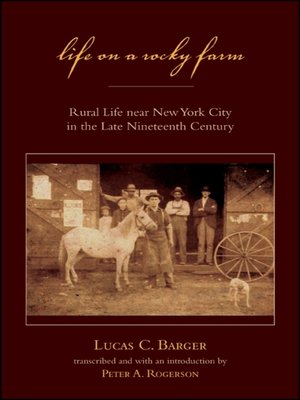Life on a Rocky Farm
ebook ∣ Rural Life near New York City in the Late Nineteenth Century · Excelsior Editions
By Lucas C. Barger

Sign up to save your library
With an OverDrive account, you can save your favorite libraries for at-a-glance information about availability. Find out more about OverDrive accounts.
Find this title in Libby, the library reading app by OverDrive.



Search for a digital library with this title
Title found at these libraries:
| Loading... |
Life on a Rocky Farm couples Lucas C. Barger's (1866–1939) eye for detail with a folksy, anecdotal style to give us a remarkable and memorable depiction of both the traditional ways of farm life, and the challenges the farmers faced as the times changed. Previously unpublished, Barger's first-hand account of farm life near New York City begins in the late nineteenth century. Little had changed for well over a century in the hilly and rugged terrain of Putnam Valley, where Lucas grew up as a member of the sixth generation of Barger farmers. But as the nineteenth century gave way to the twentieth, industrialization and mechanization decreased the demand for farm labor and farmers had to come up with alternate ways to make money.
For a long time, supplemental income came from varied means such as beekeeping and using the local forest resources to provide railroad ties, ship timber, and barrel hoops. Wealthy summer boarders from New York City also provided some extra income, but despite the short distance, transportation remained arduous, and population growth did not occur until high improvements were made in the 1930s.
Peter A. Rogerson's transcription reflects the flavor of Barger's original writing, as Barger himself said when he was first attempting to publish back in 1939, "I read something along back, that a publisher wrote, and he said, 'Do not change your style.' He claimed the style was sometimes the best part. And I guess that is what you are getting at. If you can call my scribbling a style, and you think it 'odd' use it any way you like. For my main intentions were to write an odd book as I told you once before."
For a long time, supplemental income came from varied means such as beekeeping and using the local forest resources to provide railroad ties, ship timber, and barrel hoops. Wealthy summer boarders from New York City also provided some extra income, but despite the short distance, transportation remained arduous, and population growth did not occur until high improvements were made in the 1930s.
Peter A. Rogerson's transcription reflects the flavor of Barger's original writing, as Barger himself said when he was first attempting to publish back in 1939, "I read something along back, that a publisher wrote, and he said, 'Do not change your style.' He claimed the style was sometimes the best part. And I guess that is what you are getting at. If you can call my scribbling a style, and you think it 'odd' use it any way you like. For my main intentions were to write an odd book as I told you once before."






